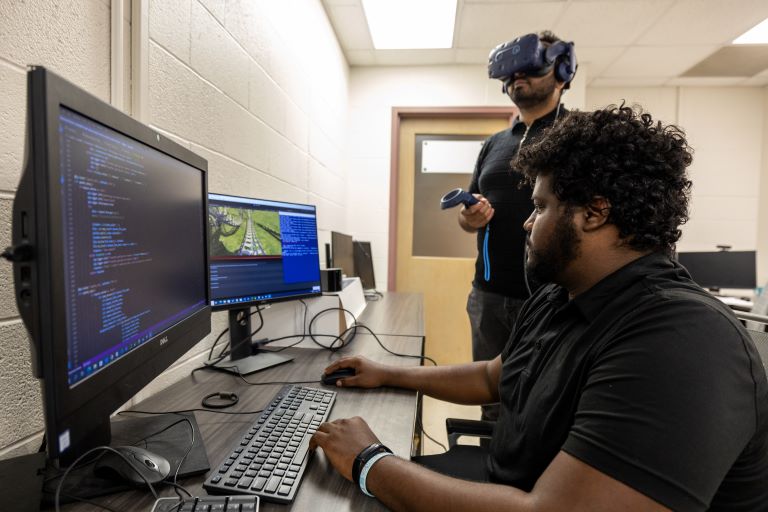September 17, 2024
Mixed reality research by Mizzou Engineer Khaza Anuarul Hoque’s team was recently accepted for the IEEE International Symposium on Mixed and Augmented Reality (ISMAR) — a flagship VR conference.

Mizzou Engineering continues to play a role in leading-edge research on AI-enabled mixed and augmented reality. Khaza Anuarul Hoque, assistant professor of electrical engineering and computer science, is part of a research team that recently had three papers accepted for the IEEE International Symposium on Mixed and Augmented Reality (ISMAR) 2024.
This conference, renowned for its focus on Augmented Reality (AR), Mixed Reality (MR) and Virtual Reality (VR), is an A* CORE-ranked event that attracts top researchers worldwide. The papers highlight the College’s commitment to advancing technology in these fields, particularly in addressing crucial privacy and cognitive challenges of AI within virtual environments.
Leading the way in privacy-preserving artificial intelligence for VR
The first paper, led by graduate research assistant Ripan Kumar Kundu and Hoque, delves into the critical issue of privacy in AI-driven VR systems. As VR technology becomes more widespread, users often face the problem of cybersickness—a form of motion sickness triggered by VR experiences.
“Current methods for detecting cybersickness rely heavily on sensitive data, such as eye-tracking and head-tracking, which poses significant privacy risks,” Hoque said. “Someone could potentially exploit this data to leak personal information, track individuals or manipulate user experiences.”
To address this, the Mizzou research team proposed a groundbreaking privacy-preserving mechanism for deep learning (DL)-enabled cybersickness detection.
“These models are not only highly accurate in detecting when you might feel sick, but they also make it much harder for anyone to misuse your personal information,” Hoque said. “They’ve made it possible for VR systems to watch out for your well-being without compromising your privacy.”
This research not only enhances the safety and security of VR experiences but also positions Mizzou Engineering at the forefront of privacy-preserving AI development, ensuring that future VR applications are both effective and secure.
Collaborating for cognitive and physical load management in VR
The second and third papers, a collaboration between Mizzou Engineering and the University of Texas at San Antonio, dive into the challenges of multitasking in VR.
The second paper, “Mazed and Confused,” examines how tasks like walking in VR can lead to cybersickness and strain. The team found that eye tracking and physiological data were key in predicting cybersickness with 95% accuracy. Their work will help future researchers develop models to reduce cybersickness and manage cognitive load in VR.
The third paper, “Predicting Cognitive Load, Attention, and Working Memory in Virtual Multitasking,” takes this a step further by using deep learning models to predict physical and mental load, as well as attention and memory in VR. These models, which achieved high accuracy, can be used to optimize VR environments in real-time for better user experiences.
Leading-edge research with widespread impact
These ground-breaking studies, sponsored by the Army Research Lab and the National Science Foundation, showcase Mizzou Engineering’s leadership in advancing VR technology. By addressing critical issues like privacy in AI and cognitive load management, Mizzou is contributing to the academic community and paving the way for safer, more efficient and more enjoyable VR experiences.
The IEEE ISMAR 2024 conference, scheduled to take place in Seattle from October 21-25, will provide a global platform for these innovations, underscoring Mizzou Engineering’s role as a leader in the rapidly evolving fields of AR, MR and VR.
Study engineering where you can make discoveries that can create a better world. Choose Mizzou Engineering!